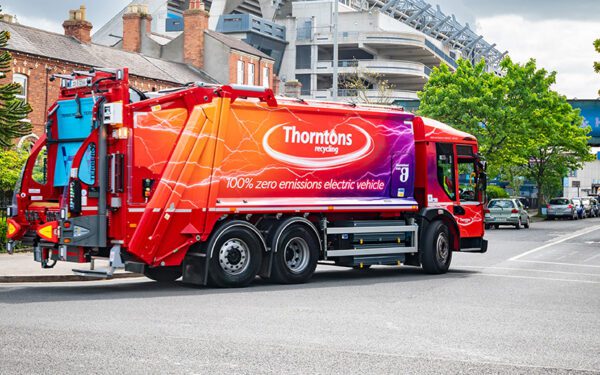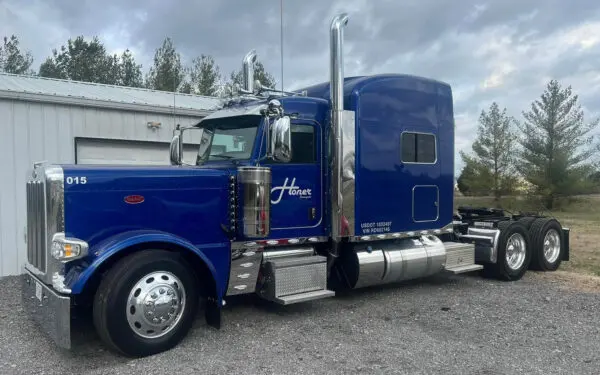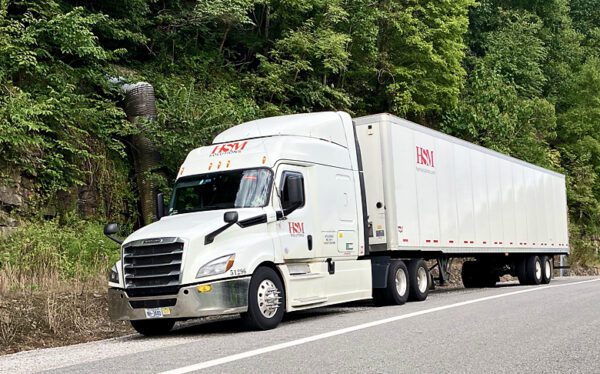An Impressive Fleet
An operation of this size requires a fleet to match. So McCulla have 100 vehicles, consisting of 93 Tractor Units, 6 Rigids and a Sprinter Van. Complementing that are 152 trailers split across 6 types, from Twin Evaporator trailers to Urban Fridges, UK-Spec Twin Deck and Irish-Spec Twin Deck, Roller-Bed trailers and finally Meat Trailers. This gives McCulla total flexibility in delivering these specialised services.
The Challenges Faced By McCulla
We then discussed the challenges that McCulla have to deal with on a day-to-day basis. Brian emphasised three key challenges that they deal with:
1. Rising Insurance Costs:
It’s now a major element of McCulla’s business to find ways to manage insurance and work closely with their insurers. They have worked very closely with their insurers to show how the CameraMatics system, alongside their traditional Bluetree telematics system, can help to not only better defend claims, but more importantly can be used as a full Fleet & Risk Management solution to improve driving behaviour and reduce claims.
The insurers were so impressed by their proposal that they agreed to part-fund the CameraMatics implementation, both in terms of hardware and the monthly fees for the cloud platform. I asked Brian why the insurers wanted to do this? He explained that, “insurance is a major, major cost to hauliers of our size, so insurers now, when they sit down, they realise that they need to better profile the fleet on its own merits rather than the traditional pooled risk, and they need to facilitate fleets to do the right things, which ultimately reduce the risk they have to underwrite.”
2. Upskilling And Training:
Brian went on to explain how they now make use of the cameras to review driver behaviour and courtesy too. Are drivers driving safely and following best-practice? Are there things they could improve? McCullas use a combination of checks against their telematics data and the corresponding footage, plus regular general checks of footage and use the clips as a review and training aid for the drivers to improve future behaviour.
What has facilitated this? Brian adds “We have had the cameras for a couple of years, but what has really revolutionised how we make use of the footage is the live remote cloud connected system. Being able to have the information at your fingertips and download footage immediately has made our compliance manager’s life so much easier and allows us to deliver very immediate and visual feedback to drivers.”
3. Social Responsibility:
This was an interesting phrase, so I asked Brian to elaborate. He said “We take road safety very, very seriously. So if an incident does happen, we have something to play back and show exactly what the cause was. The reality is that our drivers love the cameras…”
‘Hold on’ I said, ‘your drivers love the cameras? Tell me more.’
“Well, to them, it provides an element of protection because the footage shows that they were not at fault. They can refer to the footage in their reports, which is like their digital witness.”
Fraud:
Brian explained the increasing impact that fraud has had on their fleet and that thanks to their vehicle cameras they can counter this threat. I questioned the frequency and location of these incidents. Surely it can’t happen that often?
“You must be joking? We experience fraud attempts more regularly than you’d ever think and at some times of the year it’s an almost daily occurrence.”
Brian went on to explain that they experience fraud attempts pretty much evenly across all the countries and regions they operate in.
What Drove McCulla To Install CameraMatics Vehicle Cameras?
There are always one or two key reasons that drive (pardon the pun) fleet operators to install vehicle camera solutions, so I wanted to know what those reasons were for McCulla.
Brian outlined that they wanted to find a better way to deal with claims and the cameras took the process of reporting on incidents from “sketches on the back of an accident report form” to full-motion video that shows exactly what happened. It significantly decreased the time and overheads involved with accident and incident reporting and that means major savings on administrative costs and of course claims costs.
Having mentioned the training element of using the footage, I wanted to know when that came into play and if it was a goal from the beginning.
 Conard Transportation
Conard Transportation








